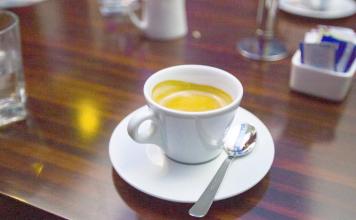A brief introduction to the planting market price of Yunnan small-grain coffee Huaguoshan boutique coffee bean varieties with moderate sour taste

Yunnan coffee is a variation of Arabic original species, after long-term cultivation and domestication, generally known as Yunnan Arabica coffee, has been cultivated for more than 100 years. Yunnan coffee due to unique geographical environment and climatic conditions, formed a strong but not bitter, fragrant but not strong, with a little fruity unique flavor, world-class coffee experts evaluation is the best coffee in the world, its cultivation technology, yield is also world-class. Coffee quality is determined by many factors such as the growing environment, climate and cultivation management techniques. Its best growth environment is low latitude, high altitude, rainfall, sunshine suitable, so north latitude 15. The ideal growth zone for coffee is between Tropic of Cancer and Tropic of Cancer. However, other areas in this zone, such as Hawaii in the United States, Saudi Arabia, etc., or low altitude, or desert with little rain, are not conducive to coffee growth. Only southern Yunnan in this zone has all kinds of conditions. According to experts, Arabica coffee should be planted in the mountains at an altitude of 800- 1800 meters. If the altitude is too high, it tastes sour, and if it is too low, it tastes bitter. The planting plot needs a certain slope, otherwise the quality of coffee is slightly poor, and the disease is particularly high.
Because of the excellent quality of Yunnan coffee, it entered the London market in the 1960s as "Lujiang No.1" and was rated as a first-class product. In recent years, world-famous coffee companies such as Nestle and Mai's have come to Yunnan to open up raw material bases, and Yunnan's products have gradually gained popularity at home and abroad. At present, the average yield of coffee in Yunnan Province has reached 96.4 kg, and a family contracted land in Lujiang has set a world record of 400 kg. "I've seen countless coffee plantations in the world," said Steisos, a chief coffee expert of the United Nations Development Programme, after visiting the Lujiang Farm coffee garden."The management here is world-class and the yield is the highest."
Catimor is an improved variety of Tibika species. It has 25% Robusta gene. The quality of Yunnan Arabica coffee is excellent. Taking Lujiangba Arabica coffee as an example, the percentage content of each main component is: crude fat 17.1, reducing sugar 0.93, starch 3.07, nitrogen 2.27, crude protein 1.419, ash 3.70, crude fiber 19.33, caffeine 2.14, sucrose 9.20 and moisture 6.87. Yunnan Arabica coffee to my image is really not very good. The simple taste was good, not bitter, not sour enough. The most disappointing thing is that Yunnan Arabica coffee is not fragrant enough, and there is not much oil. After using a high-pressure machine to get out, coffee oil and coffee bubbles are relatively small.
In the south and west of Yunnan, Pu 'er, Xishuangbanna, Wenshan, Baoshan, Dehong, Lincang and other places are the distribution areas of Yunnan Arabica coffee cultivation. As of January 1, 2012, according to the comprehensive survey of Yunnan Province, the coffee planting area in Yunnan has exceeded 800,000 mu, and it is expected that the coffee bean output will exceed 55,000 tons in this period. For the future, the blueprints of state governments in Yunnan have also been drawn: Dehong plans to expand the coffee planting area from the current 100,000 mu to 200,000 mu in the next few years; Lincang will expand the existing 20,000 mu coffee forest by 10 times to 200,000 mu in the "Twelfth Five-Year Plan"; Pu 'er also plans to expand the coffee forest from 220,000 mu to 600,000 mu. Other suitable coffee growing areas such as Baoshan and Xishuangbanna are also brewing to expand the planting scale. Yunnan Coffee Network is the only professional coffee website that comprehensively introduces Yunnan coffee information, culture and cultivation, production, processing and consumption in the coffee production chain. The weekly coffee quotation provided by this website is the longest coffee quotation in China and the most reference transaction.
It is reported that in 1892, French missionary Father Tian used coffee fruit to breed the first coffee tree outside the church door for his own coffee needs, and then cultivated more coffee trees and planted them around the church. Since then, Jukula village began coffee cultivation, and the village has been surrounded by coffee trees ever since. Qi Guanghui and Li Fusheng, the two oldest elders in the village, are both in their eighties this year. Together, they witnessed the formation of China's oldest coffee forest.
Although Zhukula is poor and backward, it is a place that has an indissoluble bond with coffee. In addition to the cultivation of coffee by the whole people, the villagers have a tradition of drinking coffee: self-cultivation, self-grinding, self-cooking, and now the village has the habit of drinking coffee regardless of men, women and children. Villagers here have a special feeling for coffee trees. Even if coffee beans do not bring them any economic benefits, villagers are reluctant to cut down a coffee tree.
Zhukula Village receives guests with local coffee and walnuts. Although the coffee brewed in earthen pots does not taste the best, this primitive drinking method reflects the villagers 'love for coffee and is also the highest courtesy reception for guests. The unique and rich original ecological coffee culture makes everyone who knows Zhu Kula have to sigh. It deserves to be called the first coffee village in China.
Yunnan coffee is mostly planted in dry and hot valley areas at an altitude of 1100 meters, so the acidity is moderate, the flavor is rich and mellow. As far as climatic conditions are concerned, the long sunshine time in southern Yunnan is conducive to the growth and photosynthesis of plants, and the large temperature difference between day and night and the low temperature at night are conducive to the accumulation of coffee nutrients. Therefore, the effective nutrients contained in Yunnan Arabica coffee are higher than those of other coffee varieties abroad. Arabica coffee is susceptible to rust, and its yield and quality are greatly affected after rust. Yunnan hot zone due to dry and wet distinct, every year fresh fruit red ripening just into the dry season, low relative humidity, is not conducive to the formation and growth of blister rust.
Zhukula coffee forest belongs to Arabica, bourbon and Typica varieties.
By 2014, the coffee planting area of Yunnan Province is 1.83 million mu, and it is estimated that the coffee planting area of Yunnan Province will reach 2.8 million mu by 2020.
main producing areas
Arabica coffee suitable for growth in the mountains 800--1800 meters above sea level, if the altitude is too high, sour taste, too low taste bitter. Arabica coffee is mostly planted in dry and hot valleys at an altitude of about 1100 meters, so the acidity is moderate, the aroma is rich and mellow. Many areas of Yunnan Province have unique environments suitable for the growth of Arabica coffee, and the Arabica coffee produced is of excellent quality.
Planting areas are mainly distributed in Lincang, Baoshan, Simao, Xishuangbanna, Dehong, Nujiang and other prefectures.
Baoshan Lujiangba average temperature of 21.5℃, up to 40.4℃, basically frost-free throughout the year, is recognized as the best coffee producing area. The Arabica coffee cultivated here is famous for its strong but not bitter, fragrant but not strong, well-proportioned grain facets, mellow fragrance and fruity flavor.
In recent years, the planting area of Arabica coffee in other producing areas of Yunnan has been expanding, the quality has also been greatly developed, and its popularity has been continuously improved at home and abroad.
After inspecting Yunnan coffee planting and primary processing bases, experts from the International Coffee Organization evaluated Yunnan coffee as Colombia wet-processed Arabica coffee, the highest quality coffee in the world
The environmental problems of coffee planting, although it can reach the hot zone standard, are far away from the equator, evaporation problems, large-scale Yunnan coffee planting land less than 1100m above sea level, severe drought in Yunnan in recent years, and frost period problems in the producing areas, etc., which make coffee planting unable to be guaranteed normally and directly affect the quality of the products. As for other processing problems and coffee farmers 'literacy problems, there is not much to say. Tea farmers drink tea for generations, but coffee farmers may not have drunk coffee in their whole lives.
Say so much, but it doesn't mean you haven't drunk a cup of good Yunnan coffee. If the post-processing and baking are good, coffee from several hills such as Pu 'er Manlaojiang, Manzhongtian Kadura, Baoshan Lujiang Baihualing Iron Pickup, Nankang Boben, etc. is still good, especially Nankang. The old varieties Typica and Bourbon at an altitude of 1800m are the main cultivated varieties of Yunnan coffee. In 1991, Katimo Catimor (more resistant to viruses and with higher yields) was introduced from Kenya. It is a variant of the Arabian species (also known as the small species). Because of the similarity of morphology and habits of these two varieties, they are often mixed and cultivated.
Tibica coffee is native to Ethiopia and southeastern Sudan and is the most widely cultivated coffee variety in the Western Hemisphere. The plants are more robust, but less tolerant to light, and yield more in Hawaii. The top leaf of Tibika is red copper color, which is called red top coffee.
Popan coffee is the second most common variety of Arabica coffee after tipica. The main branch and trunk initially grow upward at 45 degrees, drooping with fruit load, the branch nodes are dense, the results are more, and the yield is higher. But the berries are smaller and ripen slower. Bobang bud tender leaves are green, called green top coffee;
So overall, Yunnan small particles I think with American drip filtration can be, high-pressure machine out will not be more fragrant. More suitable for instant ingredients. If you really want to use small grains as a base, you must buy freshly baked beans (you can choose the kind of prepayment in Taobao, and the next batch of baked beans will be packaged directly, buy a 500g), and grind them out. This will be a little more fragrant.
Berry broadly elliptic when ripe, red, 12-16 mm long, 10-12 mm in diam., exocarp dural, mesocarp fleshy, sweet; seeds raised abaxially, ventral plane, longitudinally grooved, 8-10 mm long, 5-7 mm in diam. Flowering March-April
Cuttage material with straight branches, can not use a branch, because a branch cuttings after the growth of new plants can only crawl growth, can not grow into straight coffee trees. Cuttings should be green, not cork, leaves have been fully old and hot, strong straight terminal buds on the next 2-3, not semi-cork and cork straight branches. The leaves of the cuttings are left four wide (about 6-8 cm), each section of cuttings is 4-6 cm long, and the cuttings are cut into two, each with a leaf, and the incision is obliquely cut smooth.
Generally, the bed is made of sand, the thickness is 40-50 cm, the lower part is made of coarse sand, the upper part is made of medium fine sand, and the bed should have 80-90% shade. Wash the sand before use, or mix it with 1/2 coconut bran. The rooting rate of cuttings was high when spraying equipment was used, but the equipment cost was high.
Cuttage method cutting oblique insertion or straight insertion can be, cutting depth to bury to the leaf node for degrees. 10-15 cm in a row, with leaves not covering each other as the standard. After planting, water should be poured thoroughly to make cuttings closely contact with sand. After cutting, plastic film should be covered on the cutting bed to reduce water evaporation and improve the rooting rate of cuttings. When covering plastic film, bend it into an arch with iron wire or bamboo, insert it at the edge of the sand bed, cover it with plastic film, and then compact it to keep the humidity in the bed. If spraying equipment is used, do not cover plastic film
Important Notice :
前街咖啡 FrontStreet Coffee has moved to new addredd:
FrontStreet Coffee Address: 315,Donghua East Road,GuangZhou
Tel:020 38364473
- Prev

A brief introduction to the origin, development, history and culture of Yunnan small-grain coffee Huaguoshan boutique coffee beans
Due to the excellent quality of Yunnan coffee, Lujiang No.1 entered the London market in the 1960s and was rated as first-class. In recent years, the world-famous coffee companies such as Nestle and McDonnell have come to Yunnan to open up raw material bases, and the products produced in Yunnan are also gradually famous at home and abroad. At present, the average yield of coffee in Yunnan has reached 964 kg, and that of a household contracted land in Lujiang has reached 40%.
- Next

Long aftertaste of Yunnan small Coffee Huaguoshan boutique Coffee Bean cultivation Geographic location Climate Sea
Berries broadly elliptic, red, 12-16 mm long, 10-12 mm in diameter, exocarp dura, mesocarp fleshy, sweet at maturity; seeds raised abaxially, ventral flat, longitudinally grooved, 8-10 mm long and 5-7 mm in diam. Direct branches are used for cutting materials during the flowering period from March to April, but not a branch, because the new plants grown after cutting with one branch can only grow creeping, not straight.
Related
- Detailed explanation of Jadeite planting Land in Panamanian Jadeite Manor introduction to the grading system of Jadeite competitive bidding, Red bid, Green bid and Rose Summer
- Story of Coffee planting in Brenka region of Costa Rica Stonehenge Manor anaerobic heavy honey treatment of flavor mouth
- What's on the barrel of Blue Mountain Coffee beans?
- Can American coffee also pull flowers? How to use hot American style to pull out a good-looking pattern?
- Can you make a cold extract with coffee beans? What is the right proportion for cold-extracted coffee formula?
- Indonesian PWN Gold Mandrine Coffee Origin Features Flavor How to Chong? Mandolin coffee is American.
- A brief introduction to the flavor characteristics of Brazilian yellow bourbon coffee beans
- What is the effect of different water quality on the flavor of cold-extracted coffee? What kind of water is best for brewing coffee?
- Why do you think of Rose Summer whenever you mention Panamanian coffee?
- Introduction to the characteristics of authentic blue mountain coffee bean producing areas? What is the CIB Coffee Authority in Jamaica?

